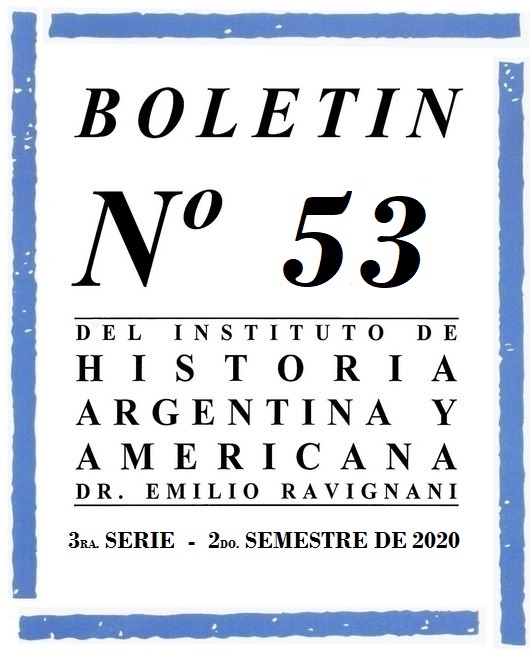Making the Law. Lawmakers and technicians. The Chamber of Deputies between 1932 and 1943.
Abstract
Weakness, ineffectiveness, inefficiency, lack of control and legislative inertia, have been the most criticized issues of parliamentary functioning throughout history. This article focuses on the Argentine parliament branch performance between 1932 and 1943. It confronts the accumulated challenges around the effectiveness of the Congress and put them in dialogue with the way in which the Chamber of Deputies took charge of them through the diverse proposals (rejected or not) destined to regulate its internal functioning.Downloads
References
Béjar, M. D. (2005). El régimen fraudulento. La política en la provincia de Buenos Aires, 1930-1943, Buenos Aires, Siglo XXI.
Cantón, D. (1966). El parlamento argentino en épocas de cambio: 1890, 1916 y 1946, Buenos Aires, Editorial del Instituto.
Cattaruzza, A. (dir.) (2001) Crisis económica, avance del estado e incertidumbre política (1930-1943), Nueva Historia Argentina, Tomo VII, Buenos Aires, Sudamericana.
Devoto, F. (2005). Nacionalismo, fascismo y tradicionalismo en la Argentina moderna. Una historia, Buenos Aires, Siglo XXI.
De Privitellio, L. (2011). Las elecciones entre dos reformas: 1900-1955, Sábato, H. et al, Historia de las elecciones en la Argentina, 1805-2011. Buenos Aires: El Ateneo.
Cámara de Diputados de la Nación (1951). El parlamento argentino 1854-1951. Buenos Aires: Imprenta del Congreso de la Nación.
Ferrari, M. (2008). Los políticos en la república radical. Prácticas políticas y construcción de poder. Buenos Aires: Siglo XXI.
García Garino, G. (2017). Una mirada al funcionamiento de una legislatura provincial: reglamento, asistencia y disciplina interna, 1852-1880. Ponencia presentada en las XVI Jornadas Interescuelas de Historia, Mar del Plata.
Halperin Donghi, T. (2004). La república imposible (1930-1945). Buenos Aires: Ariel.
Halperin Donghi, Tulio (2003) Argentina y la tormenta del mundo. Ideas e ideologías entre 1930 y 1945. Buenos Aires: Siglo XXI.
Lanteri, A. L. y Nanni, F. (2016). Espacios legislativos y políticos en la Argentina del siglo XIX. Las legislaturas. Dossier núm. 88, Programa Buenos Aires de Historia Política, dossiers/ historiapolitica.com.
López, I. (2018). La república del fraude y su crisis. Política y poder en tiempos de Roberto M. Ortiz y Ramón S. Castillo: Argentina, 1938-1943. Rosario: Prohistoria.
MacKinnon, M. (2017). El congreso en Chile y Argentina a la hora de la legislación laboral. Ponencia presentada en las XVI Jornadas Interescuelas de Historia, Mar del Plata.
Matienzo, J. N. (1931). Remedios contra el gobierno personal. Buenos Aires: Librería Anaconda.
Molinelli, N. G. (1991). Presidentes y congresos en Argentina : mitos y realidades. Buenos Aires: Grupo Editor Latinoamericano.
Mustapic, A. M. (2000). Oficialistas y diputados: las relaciones ejecutivo-legislativo en la Argentina, Desarrollo económico, vol. 39, núm. 156, pp. 571-595.
Ortiz de Rozas, V. (2017). Aproximaciones al estudio del Congreso Nacional Argentino. Contrastes, convergencias y agentes de investigación, Estudios Sociales 52 (1), pp. 65-92.
Persello, A. V. (2004). El partido radical. Gobierno y oposición, 1916-1943. Buenos Aires: Siglo XXI.
Persello, A. V. (2015a). La ingeniería institucional en cuestión en la Argentina de los años ´30. Del “estado consultivo” al “gobierno de los funcionarios. En De Privitellio, L. y López, I. La década del 30, Dossier nro. 53, historiapolítica.com.
Persello, A. V. (2015b). No quiero para mi país el voto de los delincuentes, Revista Pasado Abierto, CEHIS, año I, núm. 2, pp. 38-57.
Pinedo, F. (1946). En tiempos de la República, T. I., Buenos Aires: Ed. Mundo Forense.
Repetto, N. (1957). Mi paso por la política (De Uriburu a Perón). Buenos Aires: Santiago Rueda editor.
Rosanvallon, P. (2004). El pueblo inalcanzable. Historia de la representación democrática en Francia. México: Instituto Mora.
Smith, P. (1974). Argentina and the Failure of Democracy. Conflict among Political Elites, 1904-1955. Madison: The University of Wisconsin Press.
The copyright is transferred to the Boletín, but the authors may retrieve them and reproduce their work in other media or formats by means of a written request to the Editorial Committee. In such cases, the Boletín will be cited as the first publication of the work.
The works are licensed under a Creative Commons Attribution-NonCommercial 4.0 International License, which allows others to share the work with an acknowledgment of their authorship and initial publication in this journal.
Also, by written request to the Editorial Committee of the Boletín, the authors may separately establish additional agreements for the non-exclusive distribution of the version of the work published in this journal (for example, placing it in an institutional repository or publishing it in a book), with an acknowledgement of its initial publication here. No commercial uses are allowed.



















